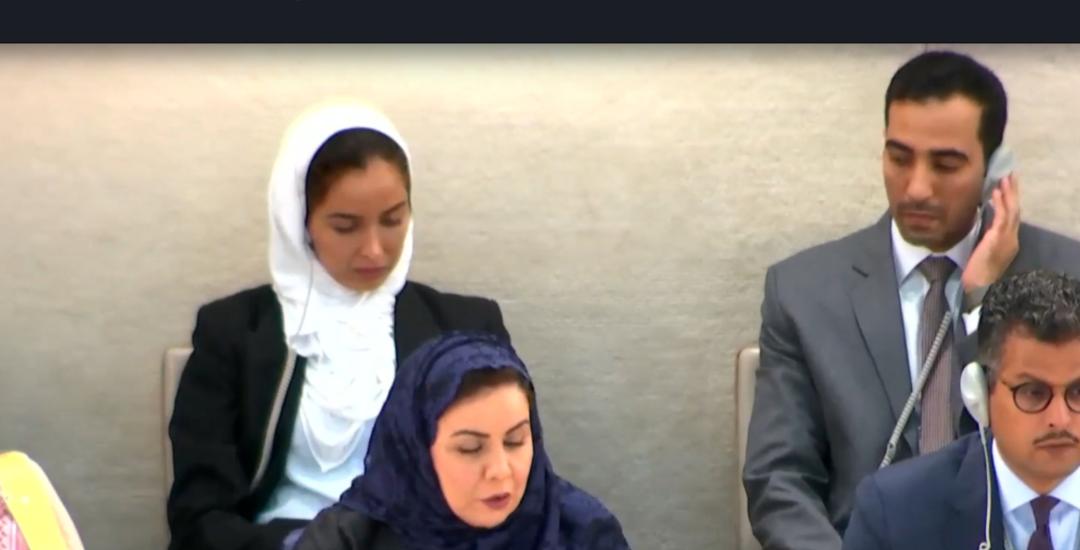
Important deliberations related to the human rights situation in the country were formulated during the interactive dialogue of the Universal Periodic Review (UPR) of the Kingdom of Saudi Arabia before the Human Rights Council, which was held on July 4, 2024, at the Palais des Nations in Geneva.
The session, which took place as part of the fifty-sixth session, was marked by active participation from representatives of civil society organizations.
During the session, numerous states spoke before the interventions of civil society organizations, which had the opportunity to express their concerns and observations on key issues.
As part of the UPR, Alkarama submitted a parallel report to the Human Rights Council regarding various issues in the country, illustrated by cases of violations that it had documented.
During the interactive dialogue, Saudi Arabia, through its representative Ms. Hala Mazyad Al-Tuwaijri, Chair of the Saudi Human Rights Commission, recalled the 354 recommendations made by the 135 member States to the Kingdom. She affirmed that these recommendations had been reviewed by Saudi national authorities and maintained that they had been favorably received. Of the 273 recommendations accepted, 24 were accepted partially. Conversely, five recommendations were rejected, while about fifty others were noted, she specified, arguing that the majority of them had already been implemented.
The statements of the Saudi representative indicated that recommendations concerning health, education, and the protection of the elderly had been accepted, while those concerning the legal and institutional framework of human rights received less commitment.
Although Saudi Arabia accepted the recommendation regarding cooperation with United Nations mechanisms, Alkarama notes that the country has not responded favorably to the opinions issued by the special procedures on human rights, particularly those of the Working Group on Arbitrary Detention. During the interactive dialogue, non-governmental organizations raised the issue of repression, persecution, and harassment perpetrated by Saudi authorities against activists and human rights defenders. They also highlighted the difficult working conditions of workers and the devastating consequences of the Saudi-Emirati joint attacks on the infrastructure of basic services in Yemen.
During its intervention, the delegation of the organization ALQST for Human Rights in Saudi Arabia highlighted the recommendations concerning the State’s adherence to the International Convention for the Protection of All Persons from Enforced Disappearance. They addressed the situation of prisoners of conscience and imprisoned activists, including lawyer Mohammad al-Qahtani and others.
The inaction of Saudi Arabia in response to previous recommendations aimed at ensuring freedom of expression was criticized, and its refusal to ratify the International Covenant on Civil and Political Rights was condemned.
Other speakers raised the issue of death sentences pronounced in Saudi Arabia in connection with the exercise of freedom of expression and called for abstaining from supporting Saudi Arabia's membership in the Human Rights Council during the next session in November.
Legislative Reform
In this context, the need to reform legislation on combating terrorism and cybercrime in accordance with international norms and treaties was reiterated. Although this recommendation had already been made during previous sessions, the actions of Saudi authorities indicate a lack of will in this regard. Some speakers criticized Saudi Arabia’s refusal to accept the recommendation to end reprisals against human rights defenders and collaborators with UN human rights mechanisms.
The Saudi activist Lina Al-Hathloul criticized her country's refusal to accept Belgium's recommendation regarding the necessity to cease reprisals against human rights defenders who interact with UN mechanisms. She highlighted the persistence of the Saudi government in its policy of targeting activists, illustrated through her own case and that of her sister, the activist Loujain Al-Hathloul. Al-Hathloul emphasized that Saudi Arabia refuses to implement the opinions of the Working Group on Arbitrary Detention concerning prisoners of conscience. She also criticized the rejection of the recommendation to lift travel bans imposed on human rights defenders and prisoners of conscience who have served their sentences.
Alkarama’s Activities
The interventions of civil society during the session highlighted the importance of the efforts made by Alkarama over the years. This includes submitting individual complaints to UN special procedures, obtaining opinions from the Working Group on Arbitrary Detention, and drafting parallel reports as part of various procedures. Alkarama notably submitted successive reports during previous sessions on human rights issues in Saudi Arabia.
The UPR Working Group considered a significant number of these recommendations formulated by Alkarama in its latest report. Among them were the ratification of the International Covenant on Civil and Political Rights, the International Covenant on Economic, Social and Cultural Rights, the Optional Protocol to the Convention Against Torture, as well as the revision of laws on combating terrorism and cybercrime.
In its report, Alkarama notably drew attention to the issue of "rehabilitation centers" established in 2007. While Saudi authorities claim that these centers are intended to implement reintegration and rehabilitation programs for individuals who have served their prison sentences for terrorism, these centers are, in reality, used to maintain the arbitrary detention of many individuals after their release, without judicial process, under the pretext that they could constitute a future "threat" due to their dissenting opinions. In practice, these centers aim to coerce political prisoners into expressing unconditional loyalty to the royal power in exchange for their release.
In its report, Alkarama also emphasized the importance of precisely defining and criminalizing torture in accordance with the standards of the United Nations Convention Against Torture, ensuring effective investigations into all allegations of torture and ill-treatment, and prosecuting those responsible for such acts.
